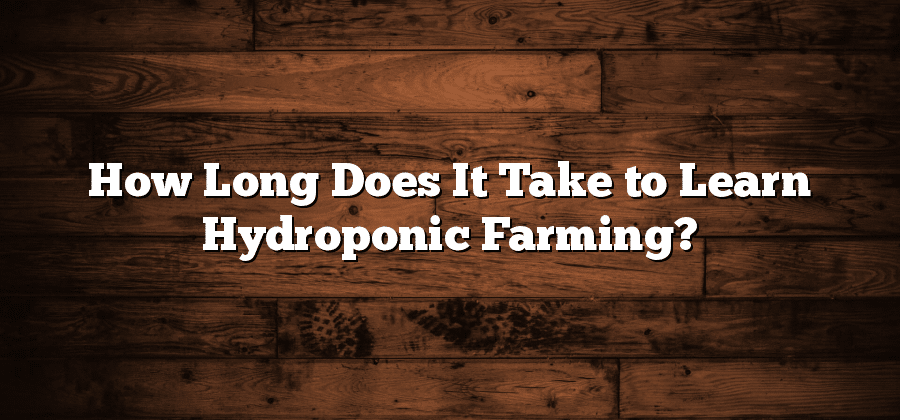Basics of Hydroponic Farming
Hydroponic farming is a method of growing plants without soil, using a nutrient-rich water solution instead. This technique offers several advantages, including higher crop yields, faster growth rates, and reduced water usage compared to traditional soil-based farming methods. Additionally, hydroponic farming allows plants to thrive in controlled environments, making it suitable for year-round cultivation and eliminating the dependency on seasonal variations.
To implement hydroponic farming, there are a few essential components to consider. First, a suitable hydroponic system must be chosen, such as the nutrient film technique (NFT), deep water culture (DWC), or vertical farming system. Each system has its own set of advantages and considerations, so it is crucial to understand the requirements of the plants being grown and the available space. Additionally, nutrient solutions play a vital role in hydroponic farming, as they provide the necessary elements for plant growth. Monitoring and adjusting the pH levels of the nutrient solution is also crucial to ensure optimal plant nutrient absorption. Overall, understanding the basics of hydroponic farming sets the foundation for successful implementation and cultivation of various plant varieties.
Choosing the Right Hydroponic System
When it comes to hydroponic farming, selecting the right system is crucial for your plants’ success. With a wide range of options available, it can be overwhelming to know where to start. However, understanding the specific needs of your plants and the space you have available can help guide your decision-making process.
One common type of hydroponic system is the nutrient film technique (NFT) system. This system involves a continuous flow of nutrient-rich water along a sloping channel, ensuring that the plant roots have constant access to the necessary nutrients. NFT systems are ideal for smaller spaces as they allow for vertical farming, maximizing the use of limited space. Another popular option is the deep water culture (DWC) system, where plants are suspended in a nutrient solution. The roots are submerged in the water, receiving ample oxygen through the use of air stones or diffusers. DWC systems are known for their simplicity and are often chosen by beginners in hydroponic farming.
Understanding Nutrient Solutions and pH Levels
Nutrient solutions and pH levels play a crucial role in the success of hydroponic farming. The nutrient solution is essentially a cocktail of minerals and elements that provide the necessary nourishment for plants to grow. These solutions are dissolved in water and delivered directly to the plant’s roots. By delivering the nutrients directly, hydroponic farming allows for faster and more efficient nutrient absorption compared to traditional soil-based farming.
Maintaining the right pH level is also critical in hydroponic farming. pH measures the acidity or alkalinity of a solution and can greatly impact nutrient availability to the plants. Most hydroponic crops thrive in a slightly acidic to neutral pH range of 5.5 to 6.5. However, different plant species have specific pH requirements, and it is essential to research and adjust the pH levels accordingly. Regular monitoring and adjusting of the nutrient solution’s pH level ensure that plants receive the right balance of nutrients and maximize their growth potential.
Selecting the Ideal Plant Varieties for Hydroponic Farming
When it comes to selecting the ideal plant varieties for hydroponic farming, there are several factors to consider. The first factor is the size of the plants. Since hydroponic systems often have limited space, it is important to choose plant varieties that have a compact growth habit. This will help maximize the use of the available space and prevent overcrowding.
Another important factor to consider is the nutrient requirements of the plants. Different plant varieties have different nutrient needs, so it is important to choose varieties that can thrive in a hydroponic environment. Look for plants that have a balanced nutrient profile and are known to perform well in hydroponic systems. Additionally, consider the pH preferences of the plant varieties. Maintaining the correct pH levels in the nutrient solution is crucial for the plants’ overall health and productivity. Therefore, choose plant varieties that can adapt well to the specific pH levels you can provide in your hydroponic system. By carefully selecting the plant varieties that are best suited for hydroponic farming, you can increase the chances of success in your hydroponic venture.
Setting Up Your Hydroponic Farming System
To set up your hydroponic farming system, there are several important considerations that need to be made. Firstly, you need to determine the size and scale of your operation. This will depend on the available space you have as well as your goals and resources. A small-scale system can be set up in a spare room or even on a balcony, while larger operations may require dedicated greenhouse space.
Next, you will need to choose the right equipment for your hydroponic system. This includes tanks or reservoirs for holding the nutrient solution, pumps for delivering the solution to the plants, and a growing medium or system for supporting the plants. There are many different types of systems available, ranging from simple and low-cost options to more complex and automated setups. It is important to do your research and choose the system that best fits your needs and budget.
It is also essential to carefully monitor and maintain the nutrient solution in your hydroponic system. This involves regularly testing the pH levels of the solution and adjusting them as necessary. Additionally, you will need to monitor the nutrient levels to ensure that your plants are receiving the appropriate balance of essential elements. By closely monitoring and maintaining the nutrient solution, you can ensure optimal growth and yield from your hydroponic plants.
Overall, setting up a hydroponic farming system requires careful planning and consideration. By considering factors such as the size of your operation, choosing the right equipment, and closely monitoring the nutrient solution, you can create a successful hydroponic farming system. In the next section, we will explore the different plant varieties that are ideal for hydroponic farming, providing you with options for what to grow in your system.






